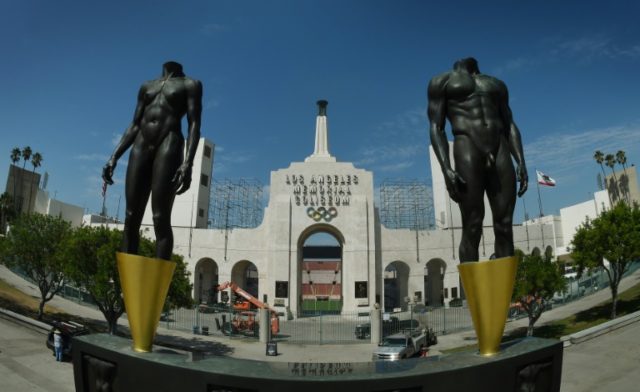Lausanne (AFP) – What should happen in an Olympic host city after the torch goes out?
For the International Olympic Committee (IOC), ensuring the Games leave a positive legacy in host communities has become a top concern, especially after multi-billion dollar facilities built for Athens 2004 were left to waste away.
The 2024 finalists Los Angeles, Paris and Budapest will from Friday present a dossier to IOC brass laying out their plans for a Games that control costs, are environmentally friendly and benefit their cities for years to come.
The legacy dossier is now considered one of the most important parts of a Games campaign and could influence the deciding vote in Lima, Peru on September 13.
– L.A. The dream scenario? –
Thanks to still-viable facilities built for the 1984 Games, L.A. bidders say they do not have anything major to construct.
Even the Olympic village will be housed in the existing residences of the University of California at Los Angeles, saving further costs.
As always in the expansive city known for snarling traffic on clogged freeways, transport is a top concern.
But L.A. says those worries are addressed in the city’s ongoing transportation upgrade project, which was approved in 2009 and is independent of the Olympic bid.
California’s coastal metropolis has also said it will strive for a “zero waste” Games, largely fuelled by solar power.
And when it comes to legacy, L.A. can point to its 1984 performance: those Games left behind a $93 million (86 million euros) surplus that helped fund sports programmes which have since benefited an estimated three million people, according to independent studies.
– Budapest: A lot to do –
Unlike its two larger rivals, the Hungarian capital would have to build most of the facilities needed for 2024.
The country’s government has said Olympic projects will be weaved into “a long-term development plan” for Budapest, considered the underdog ahead of the IOC meet at the body’s Lausanne, Switzerland headquarters.
Budapest has forecast $2.4 billion in dedicated Olympic spending, which excludes a swimming facility and stadium that are scheduled to be built for the 2017 swimming world championships and Euro 2020.
“The Olympics will only accelerate (the city’s) development…and improve its already excellent image,” Budapest mayor Istvan Tarlos said.
A Budapest win would also avenge the city’s five previous failed bids to host the Games, including an unsuccessful attempt for the first Olympics of the modern era in 1896.
– Paris: low-income housing boom? –
The Paris bid committee has said 95 percent of its needed infrastructure is already in place.
All that is left to build is a pool and a new Olympic village, which is central to its legacy plans.
The 2024 Games would be centred primarily in Seine-saint-Denis, a suburb northeast of the French capital and one of the country’s youngest and poorest metropolitan areas.
Housing shortages are acute in Seine-saint-Denis and organisers say accommodation built for the Games could leave behind an estimated 4,700 apartments for the community.
Paris has also brought on the World Wildlife Fund and Muhammad Yunus — a Nobel Peace Prize winner for giving micro-loans to the poor — to safeguard the project’s environmental and economic benefits.

COMMENTS
Please let us know if you're having issues with commenting.